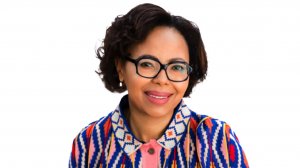Women’s participation key to economic growth – investment firm

Identity Partners co-founder and principal partner Sonja De Bruyn discussing the significant roles that women play in industry
Efforts to facilitate the greater participation of women in key sectors of the economy, such as the transport sector, are viewed with the utmost importance by women-led investment firm Identity Partners.
The impetus for developing this business, established in 2008, was the desire to increase women’s representation and participation in key segments of the economy, particularly those in which they were not traditionally represented, highlights firm co-founder and principal partner Sonja De Bruyn.
She lauds the progress that has been made towards enabling women to assume leadership positions, more recently in the financial services sector, while citing the extent of the marginalisation that permeated the sector in the past as a lost opportunity.
“There was a time when a woman wasn’t allowed to open a bank account without the signature of her husband, father or brother. I think many would be shocked that this was as recently as the late 1970s, in countries such as the US and the UK, let alone in South Africa. Women still, on occasion, do not have access to the title deeds of their homes, the properties where they live or that they share with partners. There was and can still be difficulties for women trying to access a loan on their own. These are all pathways to achieving an income and gaining assets,” De Bruyn says.
Further, this marginalisation, particularly in terms of the composition of professionals who helped shaped the financial architecture of South Africa, is still resonating.
Given this country’s political history, she contends that South Africans often have a higher sense of consciousness when assessing socioeconomic disparities. It is from this disposition that she stresses the need to make gender equity in the private sector a reality.
Infrastructure projects and partnerships can be integral to enhancing equality, in addition to safe and effective transport infrastructure’s facilitating the movement of women and, therefore, assisting in their participation in economic activity.
The firm, for example, is involved in the Gibela Rail Transport Consortium project, the mandate of which is for the manufacture of passenger rail coaches, at its factory in Dunnottar, Gauteng.
Given that this is the newest factory in global original-equipment manufacturer Alstom’s portfolio, the consortium has deployed the latest technologies and facilitates skills transfer between international experts and local staff. Gibela staff received training from other Alstom facilities abroad and came back to South Africa, skilled and equipped to make a meaningful contribution to the sector. “In terms of global standards, we can be very proud as South Africans,” De Bruyn says.
She stresses that addressing the transportation needs of ordinary commuters is crucial in promoting economy-wide efficiencies and GDP growth.
“We’re proud of the Gibela project, which is addressing the needs of passenger rail in the country. Our ability as black-owned consortium Ubumbano Rail, which is the 30% shareholder, alongside French rolling stock manufacturer Alstom, which is the 70% shareholder, comes together so well in not only increasing accessibility of commuter transport in South Africa but also improving the lives of commuters in getting to and from work every day at an affordable price,” De Bruyn explains.
The cleanliness and safety of the trains afford commuters a sense of dignity while reducing the time spent in traffic and/or waiting for road-based transport. De Bruyn also notes that alternative modes of transport are becoming more expensive and “eating into the already stretched pay packets” of ordinary commuters.
Navigating Risk, Structural Impediments
Identity Partners expects that investors and the private sector will be able to manage and price the infrastructure challenges of the energy, water and transport sectors into prudent decisions or, alternatively, consider the broader opportunities available if they were to leverage the economic potential of the broader African market.
She notes the country’s participation in the Africa Continental Free Trade Area Agreement and the initiatives of government towards ensuring that the African Growth and Opportunity Act is renewed after the prevailing review period.
Identity Partners now fosters enterprise development initiatives through its investment partnerships. Its previous development fund, the Identity Development Fund, was aimed at financing black women- and youth-owned small and medium-sized enterprises (SMEs).
“Although one might say the cheque sizes were small, the impact of this development fund was meaningful – you had over 100 black-owned businesses being funded, with more than 70% of them being black female-owned, and about 50% of them were black- and youth-owned, with a good national spread.”
The development fund has since evolved to pursue a more venture capitalist focus, with the fund being taken out of the Identity Partners Group and rebranded as IDF Capital, with a focus also on financing SMEs on the African continent.
De Bruyn believes that the future is bright for women across the spectrum of business sizes and sectors. She encourages businesswomen of South Africa to stay the course, to collaborate more, make their voice heard, and to play an active role wherever they are invested– for the transformation and development of the country and continent.
Article Enquiry
Email Article
Save Article
Feedback
To advertise email advertising@creamermedia.co.za or click here
Press Office
Announcements
What's On
Subscribe to improve your user experience...
Option 1 (equivalent of R125 a month):
Receive a weekly copy of Creamer Media's Engineering News & Mining Weekly magazine
(print copy for those in South Africa and e-magazine for those outside of South Africa)
Receive daily email newsletters
Access to full search results
Access archive of magazine back copies
Access to Projects in Progress
Access to ONE Research Report of your choice in PDF format
Option 2 (equivalent of R375 a month):
All benefits from Option 1
PLUS
Access to Creamer Media's Research Channel Africa for ALL Research Reports, in PDF format, on various industrial and mining sectors
including Electricity; Water; Energy Transition; Hydrogen; Roads, Rail and Ports; Coal; Gold; Platinum; Battery Metals; etc.
Already a subscriber?
Forgotten your password?
Receive weekly copy of Creamer Media's Engineering News & Mining Weekly magazine (print copy for those in South Africa and e-magazine for those outside of South Africa)
➕
Recieve daily email newsletters
➕
Access to full search results
➕
Access archive of magazine back copies
➕
Access to Projects in Progress
➕
Access to ONE Research Report of your choice in PDF format
RESEARCH CHANNEL AFRICA
R4500 (equivalent of R375 a month)
SUBSCRIBEAll benefits from Option 1
➕
Access to Creamer Media's Research Channel Africa for ALL Research Reports on various industrial and mining sectors, in PDF format, including on:
Electricity
➕
Water
➕
Energy Transition
➕
Hydrogen
➕
Roads, Rail and Ports
➕
Coal
➕
Gold
➕
Platinum
➕
Battery Metals
➕
etc.
Receive all benefits from Option 1 or Option 2 delivered to numerous people at your company
➕
Multiple User names and Passwords for simultaneous log-ins
➕
Intranet integration access to all in your organisation


















